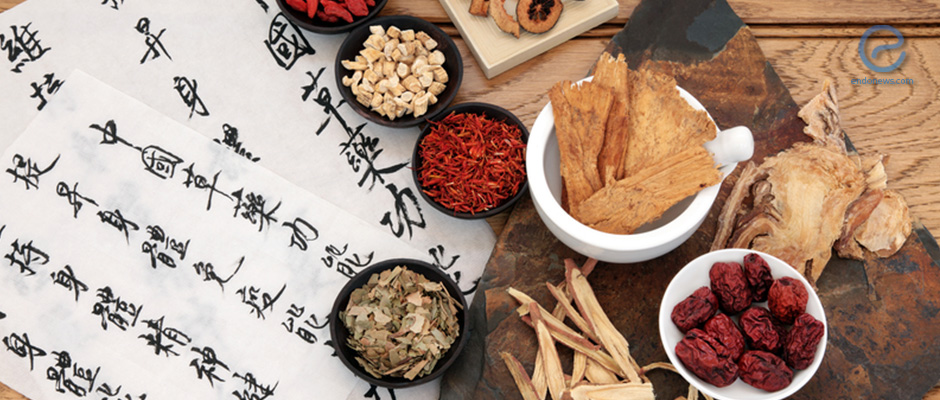Ping-Chong-Jiang-Ni Formula: A Natural Treatment
Jul 19, 2017
This study shows that Ping-Chong-Jiang-Ni Formula adversely affects endometriosis disease progression at a molecular level.
Key Points
Highlights:
- This study analyzes a Chinese herbal medicine, namely Ping-Chong-Jiang-Ni formula (PCJNF), and its impact on the pathogenesis of endometriosis.
- More specifically, this publication delves into the effects PCJNF has on ectopic endometrial stromal cells (EESCs).
- The researchers also wish to understand whether the c-Jun N-terminal kinase (JNK) signaling pathway is involved as PCJNF takes effect.
Importance:
- The authors of this paper argue that the synthetic treatments currently used by endometriosis patients are not very effective or long lasting.
- Thus it is imperative that a therapy is found that will offer some respite for individuals with this illness.
What’s done here?
- 40 Sprague Dawley rats were split into two groups: a control group that was given a saline treatment and an experimental group that was given a PCJNF extract. These rats were subject to this treatment for 2 weeks. After the two-week treatment period, blood samples were collected from the rats and PCJNF and saline serum was isolated from these blood samples.
- Human ectopic endometrial tissues were collected from individuals with endometriosis who had no hormonal therapy for at least 3 months prior to tissue collection. Cells from these tissues were cultured and subject to one of four treatments:
- Saline control serum
- Saline control serum and a selective JNK inhibitor SP600125
- PCJNF serum
- PCJNF and a JNK inhibitor SP600125
- The cultures were subject to immunocytochemistry and immunoblot analysis.
- Cell proliferation was determined using a Cell Counting Kit. Cell migration, invasion, and apoptosis were analyzed, FCM and MultiCycle software were used to determine cell cycle arrest.
- The data from the experiment was subject to statistical analysis.
Key results:
- The JNK signaling pathway is involved when PCJNF decreases cell proliferation, increases apoptosis, and stops the cell cycle at the G2/M phase in EESCs.
- The JNK signaling pathway is not involved when PCJNF suppresses cell migration and invasion.
- PCJNF uses a variety of molecular mechanisms to stop endometriosis disease progression.
- These results help prove that PCJNF could be a potentially be an option for individuals with endometriosis.
Limitations of the study:
- Human ectopic endometrial tissues were only collected from two women for this study.
- THe study is still experimental and needs to get other scientific confirmations.
Lay Summary
In the world of modern medicine, natural and herbal remedies are often under utilized. Liang et al. recently published an article in Evidence-Based Complementary and Alternative Medicine where they explored the benefits of using a Chinese Herbal Medicine to treat endometriosis. The publication is titled “Ping-Chong-Jiang-Ni Formula Induces Apoptosis and Inhibits Proliferation of Human Ectopic Endometrial Stromal Cells in Endometriosis via the Activation of JNK Signaling Pathway” and the medicine in question is known as the Ping-Chong-Jiang-Ni formula (PCJNF). In the study, the authors wished to understand the impact PCJNF has on ectopic endometrial stromal cells (EESCs). Another goal of this study was to better understand the role of the c-Jun N-terminal kinase (JNK) signaling pathway in the proposed mechanism.
The study utilized 40 Sprague Dawley rats. These rats were then split into two groups: a group given a PCJNF extract and a control group that received saline. After two weeks of treatment, blood samples were collected from the rat and those samples were used to isolate the serum. Then the researchers collected human ectopic endometrial tissues, which were subject to serum treatment. These tissues were later analyzed using a variety of methods for cell proliferation, cell migration, cell invasion, cell death, and total and phosphorylated levels of JNK, ERK, and p38 proteins.
The results of the experiment show that the JNK pathway is involved when PCJNF limits cell proliferation, increases apoptosis and stops the cell cycle at the G2/M phase in EESCs; however, the JNK pathway is not involved when it comes to PCJNF’s ability to suppress cell migration and invasion. In conclusion, this study shows that PCJNF has potential as an herbal treatment option for individuals with endometriosis.
Research Source: https://www.ncbi.nlm.nih.gov/pubmed/28656053
PCJNF JNK Chinese Herbal Medicine EESCs cell proliferation apoptosis cell cycle cell migration cell invasion

